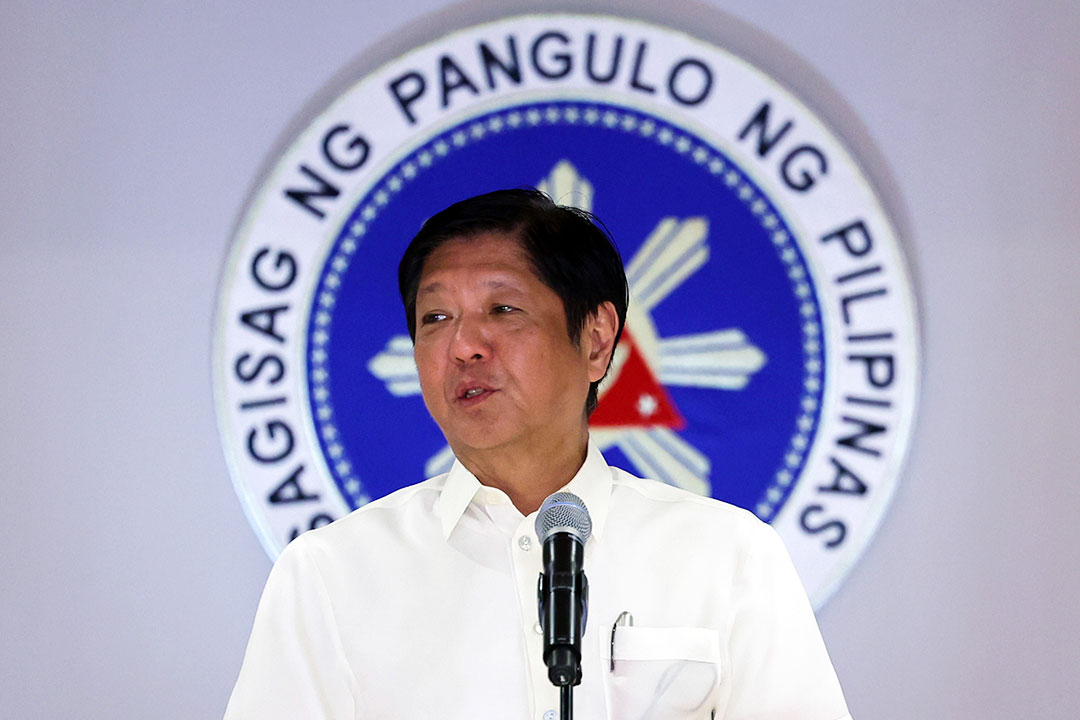Marcos: Philippines to push back against China

By John Victor D. Ordoñez, Reporter
PRESIDENT Ferdinand R. Marcos, Jr. on Monday said the Philippines would cooperate with China despite increased tensions but would push back when its sovereign rights in the South China Sea are ignored.
Ties between the Philippines and China have soured since Mr. Marcos took office in 2022, with repeated spats over disputed features in the South China Sea at a time when Manila has been forging closer defense ties with the United States.
Speaking at a Lowy Institute forum during a visit to Australia, Mr. Marcos said too much emphasis was being placed on the superpower rivalry between the US and China, at the expense of legitimate maritime interests of other countries in the region.
“It distracts us from calling out aggressive, unilateral, illegal and unlawful actions for what they are — attacks against the rule of international law and the principles of the charter of United Nations,” he said.
In a departure from his predecessor’s pro-China stance, Mr. Marcos has accused China of aggressive acts within the Philippines’ exclusive economic zone in the waterway, including the use of water cannon and collision tactics to drive away Philippine vessels in areas China claims as its own territory.
Under Mr. Marcos, the Philippines has nearly doubled the number of its bases accessible to US forces, including three new sites facing Taiwan.
US-Philippines military exercises have taken place regularly for decades, but maneuvers have extended recently to include joint air and sea patrols over the South China Sea and close to Taiwan, actions China has seen as provocations and “stirring up trouble.”
China, which claims sovereignty over most of the South China Sea, has accused the Philippines of repeatedly trespassing on its territory, while urging dialogue to prevent mishaps.
“There are those who sometimes justify such provocations under the pretext of geopolitics and mischaracterize the remedies availed of by the aggrieved as mere tactics in this grand strategic game,” Mr. Marcos said.
“Our independent foreign policy compels us to cooperate with them on matters where our interests align, to respectfully disagree on areas where our views differ, and to push back when our sworn principles such as our sovereignty, our sovereign rights and our jurisdiction… are questioned or ignored,” he added.
Meanwhile, the Philippines’ Department of Foreign Affairs (DFA) said joint patrols in the South China Sea are legal.
“Activities that infringe upon the Philippines’ sovereignty and jurisdiction in Bajo de Masinloc (Scarborough Shoal) and its surrounding territorial sea are violations of international law, particularly UNCLOS (United Nations Convention on the Law on the Sea) and the 2016 arbitral award,” Foreign Affairs spokesperson Ma. Teresita C. Daza told reporters in a WhatsApp message.
China’s Defense Ministry earlier said the patrols threaten regional peace.
Last month, the Philippines started patrols around Scarborough Shoal as China continued to block Filipino fishermen from their traditional fishing ground that Beijing has occupied since 2012.
This came after Chinese Defense spokesperson Zhang Xiaogang said Philippine joint military exercises and patrols would jeopardize regional peace and stability and violate the principles of the Declaration on the Conduct of Parties in the South China Sea.
In 2002, member-states of the Association of Southeast Asian Nations (ASEAN) and China signed the declaration that aimed to “enhance favorable conditions for a peaceful and durable solution of differences” in the waterway.
A United Nations-backed tribunal in 2016 said China’s claims were illegal.
Also on Monday, the US government through its Trade Development Agency (USTDA) would give the Philippine Department of Transportation a P55-million grant to boost the Philippine Coast Guard’s maritime traffic monitoring capacity, the US Embassy in Manila said in a statement.
“The USTDA grant will provide the DoTr and PCG with the necessary technical expertise and cutting-edge US solutions to implement the project,” US Ambassador to the Philippines Mary Kay L. Carlson said during the signing ceremony in Mandaluyong City.
Meanwhile, Foreign Affairs Secretary Enrique A. Manalo told a maritime forum in Melbourne that the Philippines would continue pushing cooperation and diplomacy over the use of force in the South China Sea.
“For the South China Sea and the seas and oceans of the Indo-Pacific to be unifying domains of peace, stability and prosperity, we need to gather more strongly around a collective responsibility, as well as a shared sense of stewardship,” he said in his speech, a copy of which was sent to reporters via WhatsApp.
“The shared stewardship of the seas and oceans in the region behooves us to unite in preserving the primacy of international law so we can ensure equitable and sustainable outcomes for all.”
“The Philippines and China continue to engage each other through dialogue and diplomacy,” DFA said in a separate statement.
“However, the Philippines abides by the principle of respect for sovereignty, sovereign rights and jurisdiction in accordance with international law and the rules-based international order.” — with Reuters



